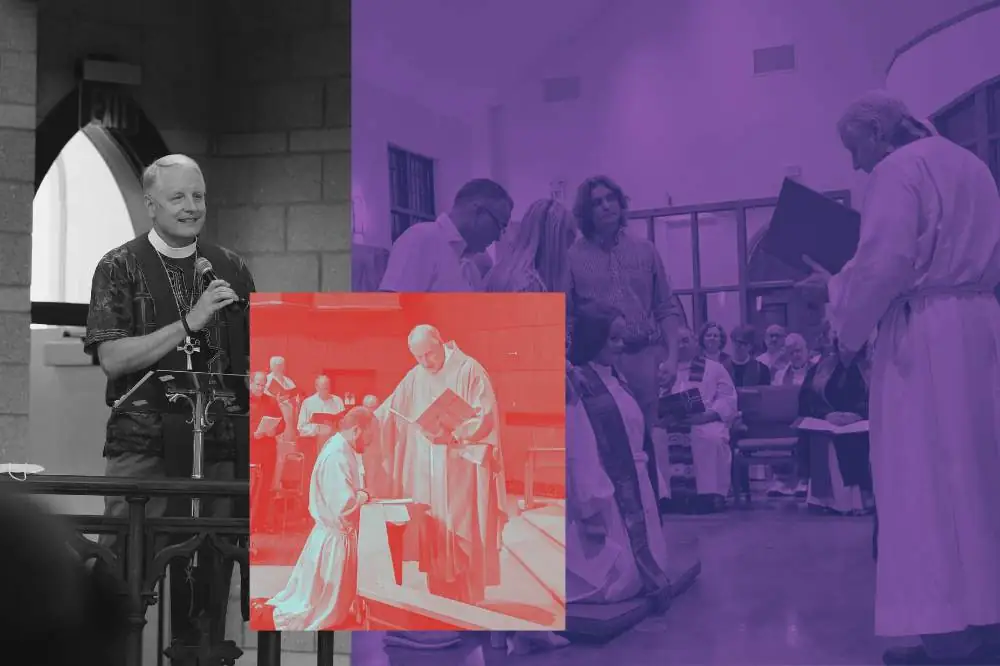Forty years ago when I was in seminary, the one unforgivable sin as we were finding our Lutheran theological voice of proclamation was works righteousness. Pelagianism! Oh, the scandal of it all.
It wasn’t just the seminary. Every candidacy committee was looking in interviews with their candidates to hear about grace and our relationship with God in terms of what God initiates and makes possible in Jesus. In other words, “able to articulate Lutheran theology.” If there was one thing I was intent on carrying into my admittedly unusual experience as the intern at the American Church in Berlin beginning in 1984 (the wall was still up for five more years), it was, as should be the case for all Lutherans, that “we are justified by God’s grace through faith apart from the works of the law.”
I found out once I got to Berlin that there was no church office. We had a fourth-floor apartment two blocks from the Ku’damm, one of the few remaining multi-story buildings in town that had somehow avoided the Allied bombs in 1945. Theologian Karl Barth had lived in that building for a time in the 1930s. We had a futon bed (which we had never heard of, much less seen) in the living room, a smaller-than-dorm-size refrigerator, and a desk with a 1940s manual typewriter. There was a bathroom, but no washer or dryer in the building. Our congregation leased a German Church building from 1738 that was only available to us on Sunday mornings. We had no car, so it took over an hour to get to the church by subway or bus.
I also learned upon my arrival there that the John F. Kennedy School, where many of our church members attended, was a bilingual German/English kindergarten through International Baccalaureate school. Because it was under the administration of the German public school system, it was required to offer religious instruction (you had to choose Catholic or Protestant) in every grade. But because they were a bilingual school, religious instruction also had to be offered in English, AND they had nobody at the school qualified to teach Religion who was fluent in English. So the school contacted the American Church, and before I got there, the American Church appointed me to be the year-long, twice-a-week instructor for kindergarten, 2nd grade, 6th grade, and 9th grade. No curriculum whatsoever. No internet. Just me and what was in my head, making up eight lesson plans per week for the whole school year.
In my Kindergarten class was a quite precocious little girl named Nadine. She was sure she knew everything about not only God but life in general. I had decided the best way for me to get to know the students and where they all were religiously on the first day was to give them crayons and markers and blank paper and ask them to draw their idea of God and then we’d take turns interpreting them to the class. So we did, and I was pleased with how it went.
All year long in whatever class I was teaching, I hammered home the grace of God, that there was nothing we could do to make God love us any more and nothing to make God love us any less. That one thing I wanted them to know. God loves them because of who God is, not because we deserve it, nor does God stop loving us when we act in unloving ways.
At the end of the year, I had the idea to repeat my exercise with all levels of students to see how they might have changed. I also asked them to share what they thought God might say to them if God could only say a few words. On this last day, I realized more profoundly than ever how utterly counter-intuitive the Gospel of grace really is. On the last day of school, little Nadine drew almost the identical picture of God on a throne and with a beard that she had drawn the first day, but now she could read and write a little. Coming out of God’s mouth in a conversation bubble as the one thing God wanted Nadine to know was simply, “Nadine, it’s your own fault!!!”
So much for grace. It’s been one of those insider jokes for Wendy and me ever since. When one of us messes up something, the other one deadpans, “Nadine, it’s your own fault!” Or sometimes simply, “Nadine…!” We know the rest of the phrase.
The Gospel of God’s grace is indeed liberating and virtually unbelievable. And yet it is core—foundational—to our Lutheran witness and our own personal and corporate faith. Not behaving “good enough” morally as many on the far right imply, not being thoroughly absorbed in the passionate pursuit of social justice as the left might urge, but simply because of who God is. You are unlovable yet loved, flawed but forgiven, always precious in God’s sight and therefore in the sight of all who know God and follow Jesus.
Walking with you,





